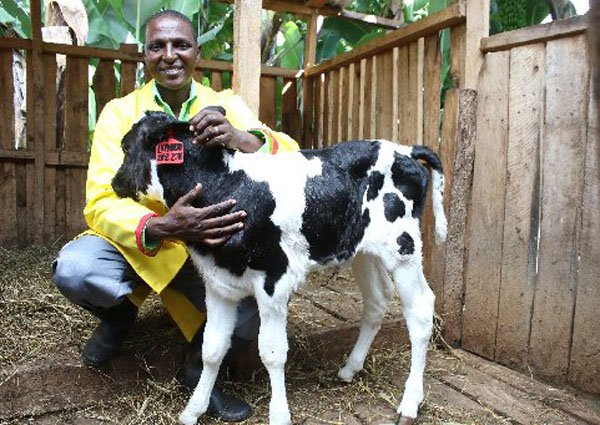Itiri dairy Farm is owned by Timothy Mwirigi. It is situated in Central Imenti, Meru County. It is a model farm for those starting dairy farming in Kenya.
“Before I fully went into dairy farming in 2014, I used to plant coffee, tea, French beans and passion fruits. I still have tea and coffee but they do not have good returns nowadays, the reason I am planning to uproot them.”
The farmer keeps a total of 17 cows, five which are in-calf and eight that he milks getting about 25 litres from each. The rest are calves and heifers.
“The cows consume an average of 30kg each of silage daily,” he says. Currently, he has 98 tonnes of silage in a bunker which will last until next year. “As a farmer, you have to plan well for feeds, and silage is good in helping one do that. Even if we have a prolonged dry spell now, I am guaranteed of quality feeds.”
He makes the silage from maize that he grows on an acre-and-half that he has leased.
“I start by chopping the maize stalks into pieces and putting them in a heap. Then I add molasses to speed up the fermentation process, cover the mixture with a plastic paper and bury it in a four-foot deep bunker,” explains Mwirigi, adding he further feeds his cows on sweet potato vines, bean stalks, lucerne, hay and dairy meal mixed with molasses.
He uses the Total Mix Ratio, where energy fodder comprises of 70 per cent, proteins 23 percent while minerals and water consist of about 7 per cent.
All his cows have tags that help him track each of them for proper management.
The tags indicate the name of the animal, the bull that sired it and the date it was born.
To ensure proper hygiene, his three zero-grazing units are cleaned twice daily.
“The urine, water and cow dung drain far away from the resting area to avoid any infections, specifically the dreaded mastitis. The dirt ends up on two different edges of the farm where I grow napier grass.”
Mwirigi advises farmers to invest in cow mattresses because the more comfortable cows are, the more the milk output.
“All my 17 cows have improvised sleeping mattresses made from sacks and sawdust, which I spray every week to prevent pest infestation. I also play them soft music when milking at 6am, 2pm and 8pm. I do the milking manually,” the father of two girls says.
About 90 per cent of the milk produced at the farm is supplied to Mbwi Njeru Arithi Dairy Society at Sh35 per litre. The rest is used to feed the calves and for family use.
To ensure there are seamless operations on the farm when he is not present, Mwirigi, who starts his day at 5am, has employed two workers.
But most importantly, he has up-to-date records that capture every single activity on the farm.
In his office just beside one of his three cowsheds are many files containing reports on feeding, finances and general health of the animals.
Other records include those of the cows’ weight, reproduction, diseases and normal growth.
“Proper recording is one of the requisite managerial decisions that must be carried in any dairy farm because it enables one to monitor the animals.”
Income from farm tour
To visit the farm for lessons, he charges farmers Sh500 each. Mwirigi also makes a tidy sum from leasing the diesel-powered chaff cutter.
With about 15 litres of diesel, the machine chops up to 30 tonnes of maize stalks in a day. “My dream is to eventually mechanise all the operations at Itiri,” says Mwirigi, who also sells heifers for between Sh100,000 and Sh200,000.
However, it is not all rosy. His three cows were recently infected with actinomycosis, a bacterial infection that causes sores, or abscesses, on the animal’s soft tissues. He used an injectable called Closamectin to treat it.
“My next plan is to start a yoghurt plant and place a milk ATM in Meru. I also want to be a serious breeder in the near future,” says the father of two, who started with seven cows, five Aryshires and two Friesians in 2014.
The cows were not giving him much, making him sell two of them and improve the breeds after getting training in basic dairy management training from SNV, the Netherlands Development Organisation agency in Kenya.
Fred Ochido, a dairy consultant at SNV in Meru, said farming earns more when one does it as a business, hobby and agri-tourism where people visit a farm to learn.
“Farmers’ training acts as a knowledge hub, even for those who can access the internet. Basic skills in housing, spacing, planning, deworming, feeding, weighing, handling of cows and grouping (lactating, dry cows, calves and heifers) are key to running a model farm.”










